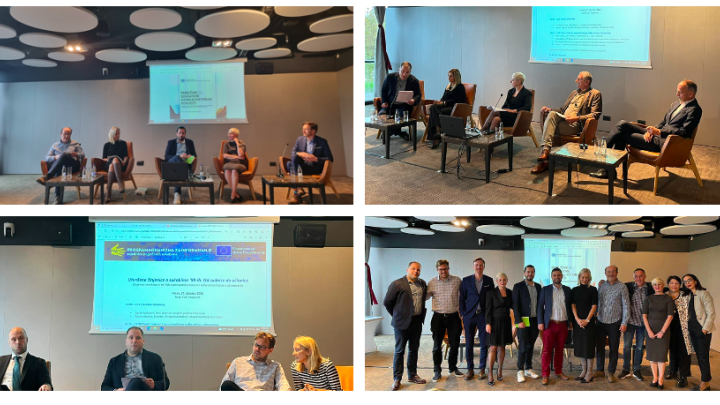MIP holds conference and launches its Guide for History Teachers in Podgorica

On 27 October 2023, the Mechanism Information Programme for Affected Communities (MIP) held a conference entitled The Conflicts of the 1990s: From Courtroom to Classroom – Utilising Facts Established by the ICTY and IRMCT in Education in Podgorica, Montenegro. The conference was organised jointly with the European Association of History Teachers (EuroClio) and the Association of History Teachers of Montenegro (HIPMONT).
The former Minister of Foreign Affairs of Montenegro, Mr. Đorđe Radulović, opened the conference. He emphasised the importance of preventing historical events from being distorted by nationalism fueled by political elites, and the need for Montenegrin society to address its past as a prerequisite for a peaceful future. Mr. Radulović stated: “It is necessary to create a socio-political environment where young people can openly discuss what happened without feeling any guilt. These processes are far from easy. Therefore, academic and educational policymakers, NGOs, and all of us must invest our social capital to prevent the repetition of the past and promote European values of peace and coexistence.”
The Director of EuroClio, Mr. Steven Stegers, also delivered opening remarks, underscoring the necessity of educating young people to prepare them for engaging in challenging discussions about the 1990s conflicts in the Balkan region. He stressed that, although young people will uncover uncomfortable facts about their own communities, through such education, they can come to mutual understanding and confront their difficult past. Mr. Stegers stated: “Since society itself often fails to do this, history teachers must step in to address the lack of transparency by politicians and the public, as well as within families. This is a challenging task, but the constructive treatment of the past is necessary to prevent future conflicts.”
Two panel discussions followed the opening session. The first, led by MIP youth outreach coordinator Ms. Anisa Sućeska, highlighted the MIP’s efforts to make the judicial records of the ICTY and Mechanism more accessible to the public, especially young people. Ms. Sućeska emphasised the importance of using these records to enhance educators’ understanding of the region’s recent history, as well as to promote peacebuilding and reconciliation in the Balkans. The panel also featured national education experts and policymakers from Montenegro, namely: Mr. Radovan Popović, Deputy Director of the Institute for Education; Mr. Rade Vujović, President of HIPMONT; and Ms. Daliborka Uljarević, Director of the Center for Civic Education. They spoke of the challenges and opportunities of integrating the ICTY and Mechanism’s legacy into formal education.
During the second panel, the Guide for History Teachers: How to Use Archival Material of the ICTY and Mechanism in Teaching the History of the 1990s Conflicts (Guide) was introduced. Developed by the MIP, in collaboration with EuroClio and representatives of teachers’ associations from across the former Yugoslavia, the Guide was designed to assist history teachers improve their knowledge and enhance their skills by using ICTY and Mechanism archival material to create lesson plans on the 1990s conflicts in the region.
As part of this panel, four of the authors of the first volume of the Guide outlined their chapters and shared their experiences, addressing sensitive topics related to the conflicts. The panel then continued with insights from a group of 10 history teachers from the former Yugoslavia who had contributed to the second volume of the Guide. This volume offers suggestions and resources covering specific topics such as the Legacy of the ICTY and History Teaching, Children in War, Women in War, Destruction of Cultural Heritage, and Migration. Through discussing the Guide with the presenters, conference participants had a unique opportunity to exchange ideas on practical ways to utilise the ICTY and Mechanism archives in teaching and, more generally, to engage in constructive dialogue on issues of justice, accountability, and reconciliation.
With more than 60 attendees, this conference was part of the MIP’s broader initiative to train history teachers from the former Yugoslavia in effectively incorporating judicially established facts into educational materials related to the region’s 1990s conflicts. Since the project’s launch in January 2019, the MIP has successfully conducted workshops attended by over 600 history teachers.
Funded by the European Union, the MIP aims to enhance the knowledge and understanding of citizens and communities in the countries of the former Yugoslavia regarding the crimes committed during the conflicts of the 1990s, drawing from ICTY and Mechanism cases.